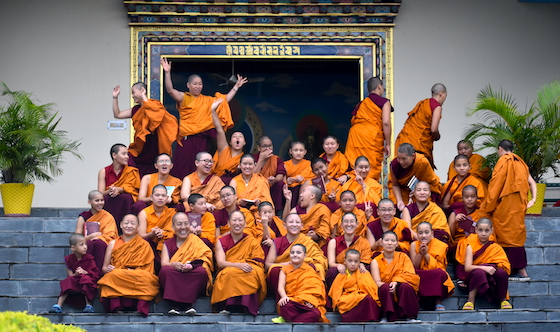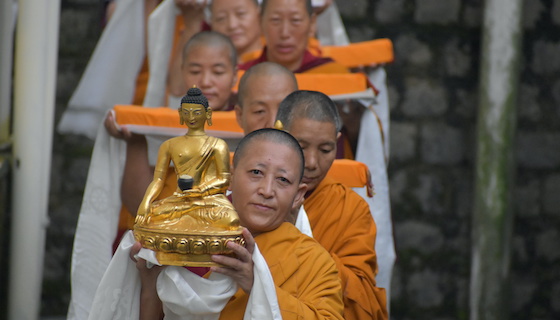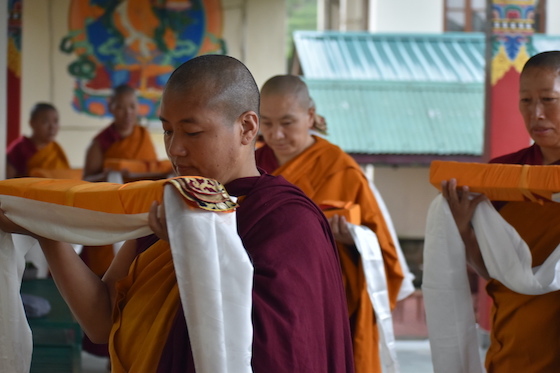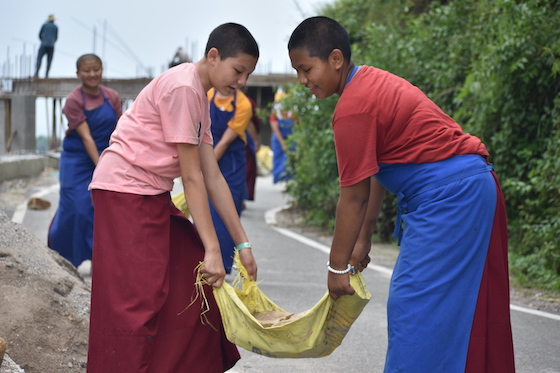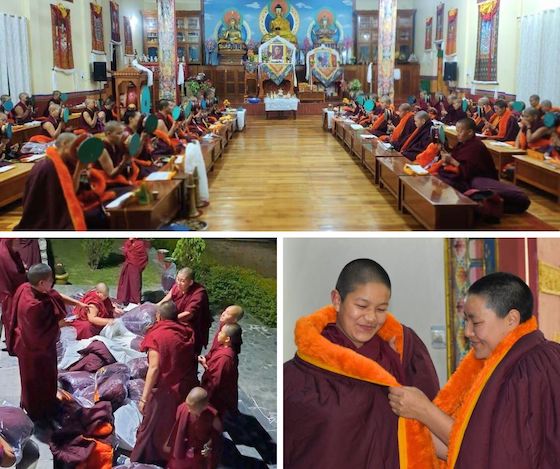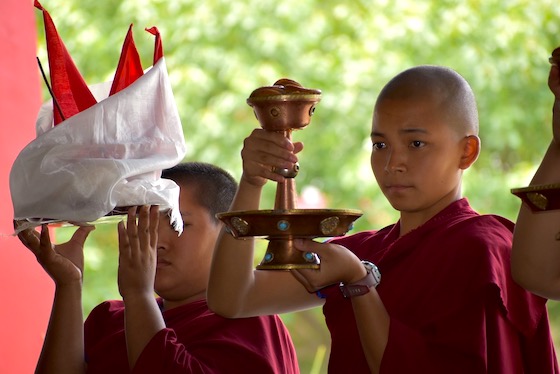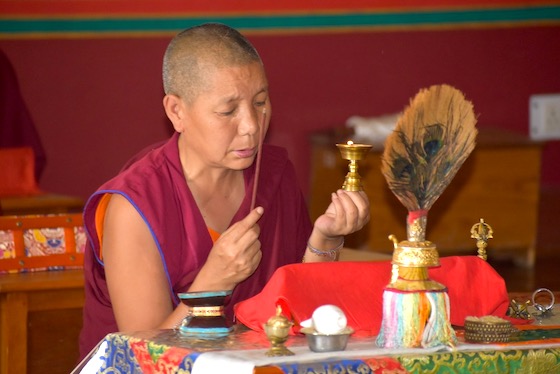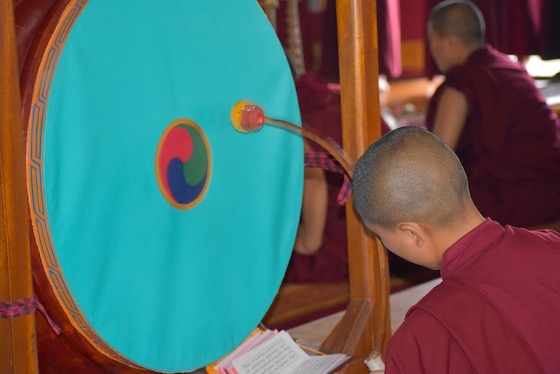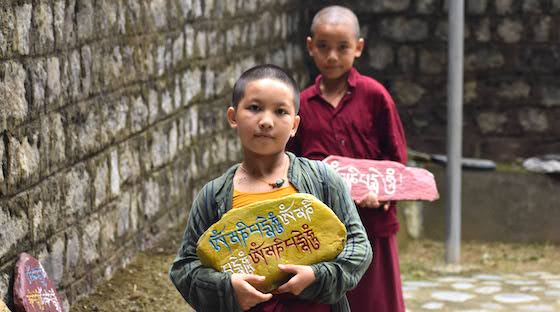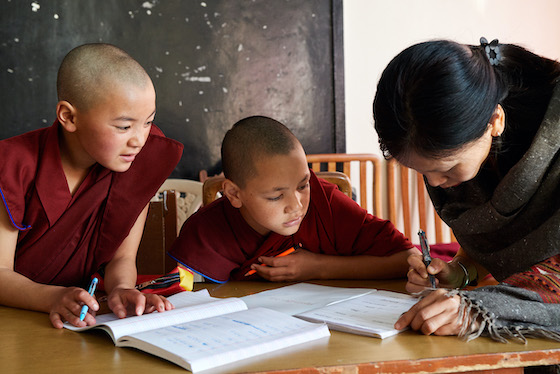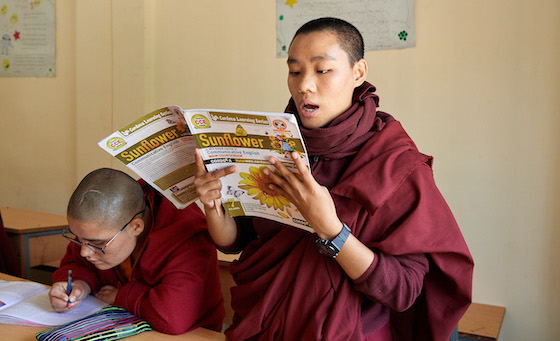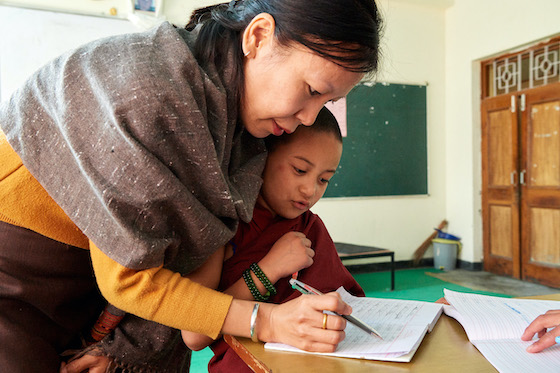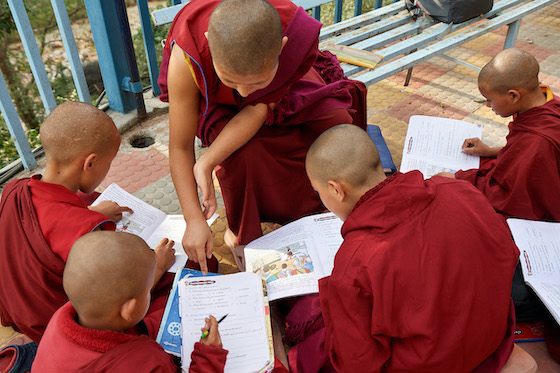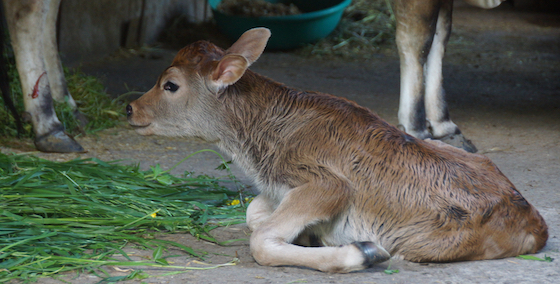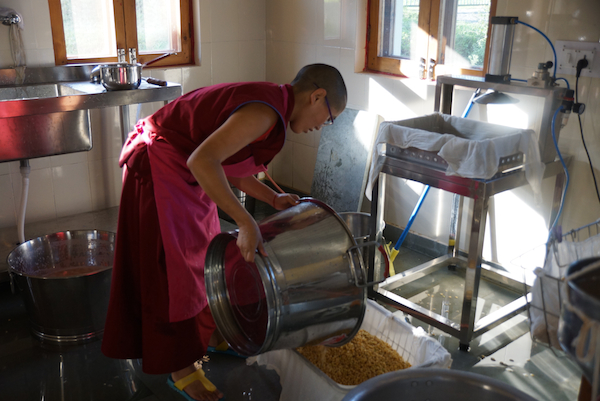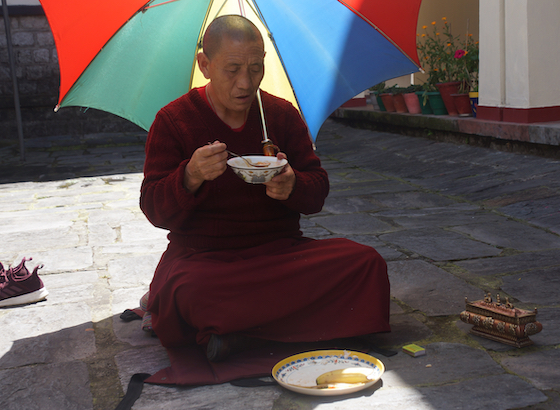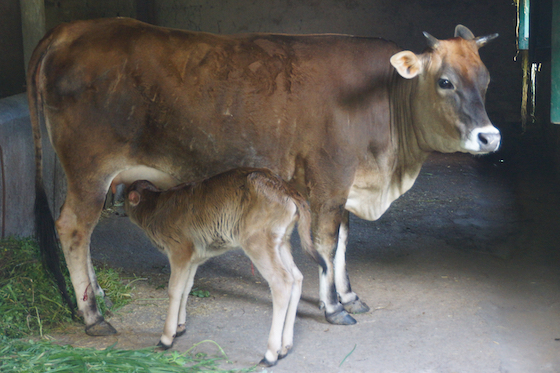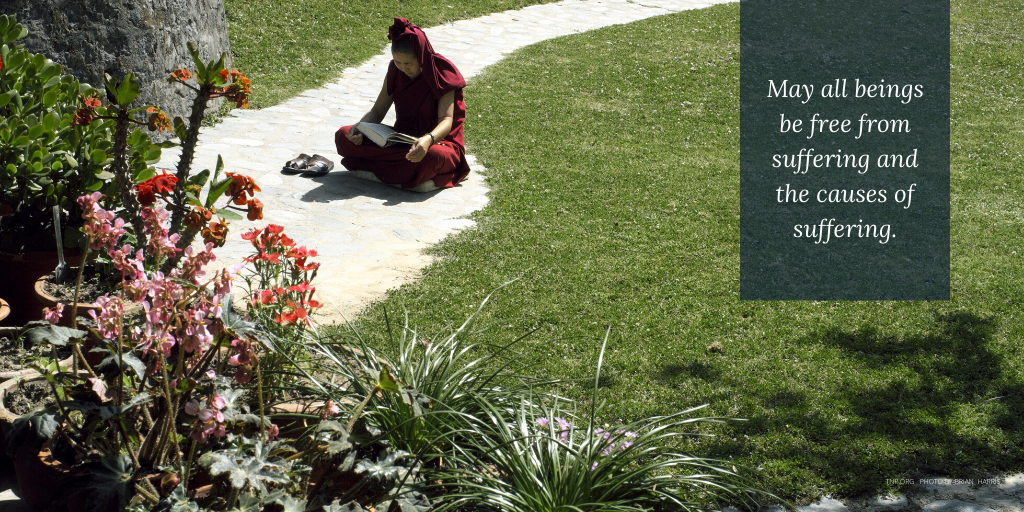The Tibetan Buddhist nuns in India celebrated His Holiness the Dalai Lama’s 90th birthday with dozens of special events. Here is a photo essay of the celebrations at Dolma Ling and Shugsep nunneries in northern India with pictures by the nuns. Both nunneries were built and are fully supported thanks to Tibetan Nuns Project donors and sponsors.
Celebrations at Dolma Ling Nunnery
The celebrations at Dolma Ling ranged from solemn prayers and offerings for His Holiness’s long life to educational activities and joyous games. The Dolma Ling Media Nuns captured the magic of the weeks of festivities.
Overnight Tara Prayer Offering
On Tsewa 15, during the sacred month of Saga Dawa, the nuns held an overnight chanting of the Tara mantra, known in Tibetan as Dolma Tsentsok. The date was a Wednesday, the day that the nuns traditionally do the Tara puja because it is considered an auspicious day for His Holiness the Dalai Lama.
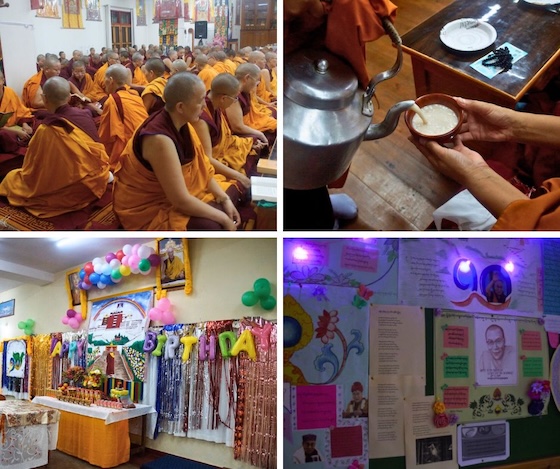
The nuns did an overnight chanting of the Tara mantra as part of the birthday celebrations.
The nuns dedicated long-life prayers for His Holiness. The Tibetan for Tara is “Dolma”, and thus “Dolma Ling” means “Place of Tara”. Tara is believed to be a Bodhisattva of compassion and a protector who relieves physical, emotional, and spiritual suffering. She is known as the “mother of liberation”.
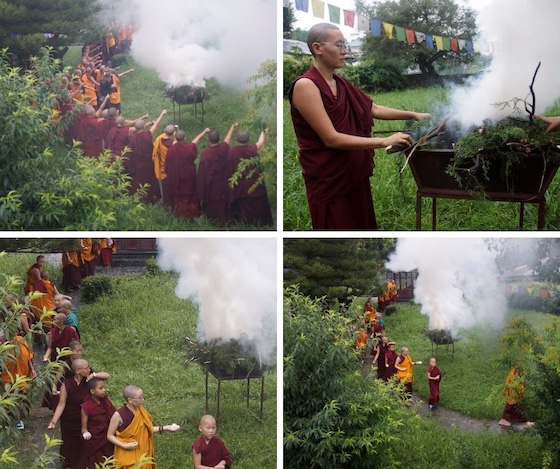
Sangsol or incense offering ceremony is an ancient Tibetan tradition for special occasions such as His Holiness the Dalai Lama’s birthday and at Losar, Tibetan New Year.
As part of the birthday celebrations, the nuns also held a special incense offering ceremony called sangsol. It is traditional for Tibetans to burn incense and fragrant juniper bows as an offering on occasions such as the Dalai Lama’s birthday, marriages, and at Tibetan New Year.
Environmental Clean-Up Campaign
As part of the many celebrations of His Holiness the Dalai Lama’s 90th birthday, on June 28th, the Tibetan Buddhist nuns at Dolma Ling Nunnery did an environmental cleanup of the areas in and around the nunnery, including Norbulingka and the Khanyara River.
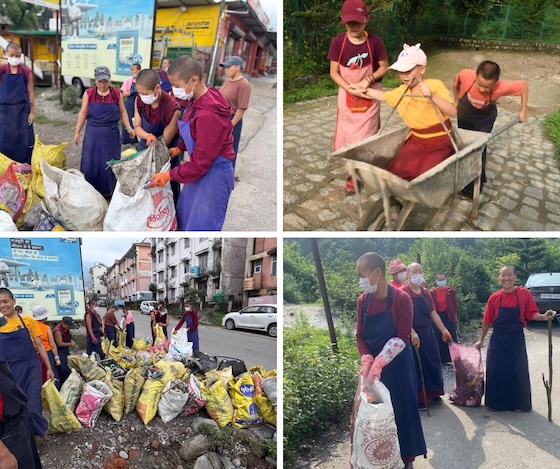
Nuns celebrate His Holiness the Dalai Lama’s birthday with an environmental clean-up on June 28th..
The nuns were honoring His Holiness the Dalai Lama’s deep commitment to the environment. They hope that their efforts promote care for nature and public awareness about environmental responsibility.
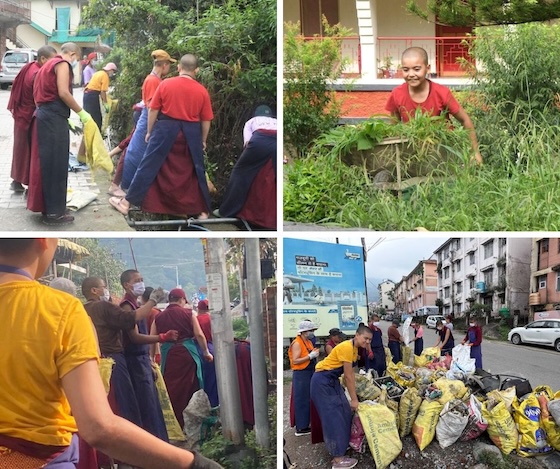
His Holiness the Dalai Lama has said, “This planet is our only home; we are all responsible for taking care of it.” The nuns honored His Holiness’s commitment to the environment with their clean-up efforts.
Tibetan Studies Debate
Dolma Ling Nunnery and Institute hosted a debate on Tibetan studies, showcasing the nuns’ academic engagement and commitment to preserving the Tibetan language and culture. The annual discussion on Tibetan Studies took place on June 4th, 2025, and the nuns discussed and debated the topics of Pharchin, Zoe, Tarik, and the Tibetan language.
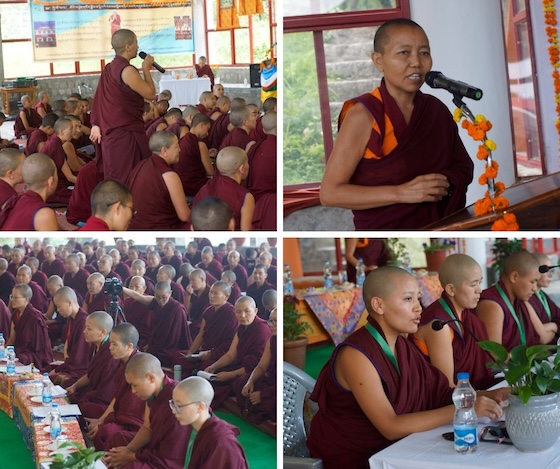
The annual Tibetan Studies debate at Dolma Ling was dedicated this year to His Holiness the Dalai Lama’s birthday and was held on June 4th, 2025. Upper right is the new principal, Geshema Delek Wangmo.
Essay Competition
Both Dolma Ling and Shugsep nunneries held essay-writing competitions to mark the occasion. The nuns wrote in Tibetan. Traditionally, Tibetan nuns did not have access to the same level of education as monks. Now Tibetan nuns, such as those at Dolma Ling, have the opportunity to learn their own written language and various forms of Tibetan calligraphy.
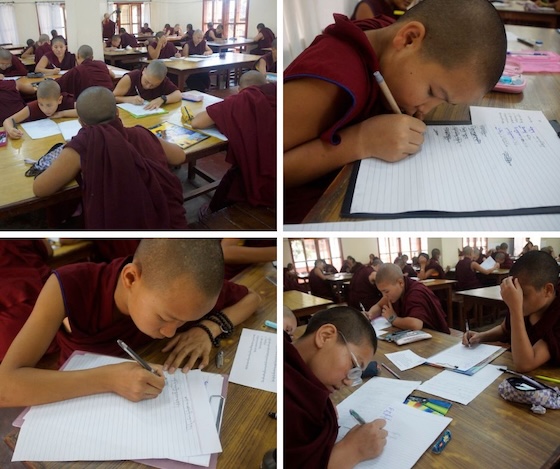
The essay-writing competition at Dolma Ling Nunnery and Institute.
Annual Flower Competition
Each year, the nuns at Dolma Ling hold a flower competition to celebrate His Holiness the Dalai Lama’s birthday on July 6th. It’s monsoon time in northern India, so this year’s judging took place in the rain. The nuns set up multiple altars in the nunnery courtyard with offerings and portraits of His Holiness the Dalai Lama.
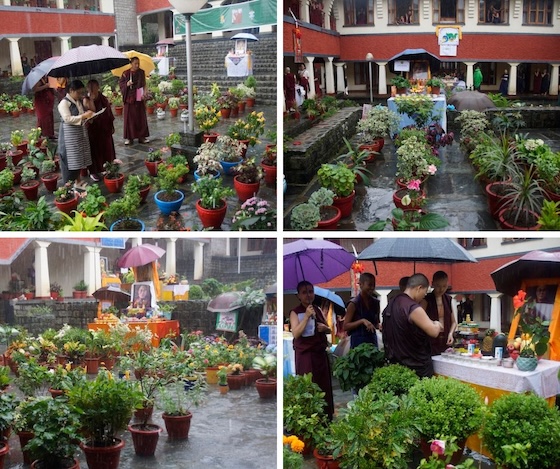
Flower competition at Dolma Ling for His Holiness the Dalai Lama’s 90th birthday on July 6, 2025.
For Buddhists, it is traditional to offer flowers to the Buddha. Flowers are significant as offerings because their freshness, fragrance, and beauty are impermanent. They are a reminder of the Buddha’s teachings that all things are impermanent.
Fun and Games
His Holiness’s birthday is a day of great joy. In addition to solemn prayers for his good health and long life, the nuns held laughter-filled fun and games, including trying to feed each other cake with blindfolds on and playing badminton in the courtyard.
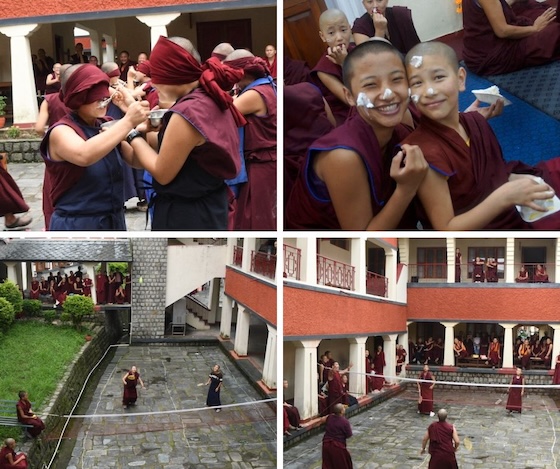
Some of the fun and games included a joyous game of feeding cake with blindfolds on and badminton games.
Celebrations at Shugsep Nunnery and Institute
As at Dolma Ling, the nuns at Shugsep Nunnery organized a series of meaningful activities and spiritual offerings to mark this very special occasion. Their activities were varied and included public service events and a three-tiered birthday cake decorated with the snow lions of Tibet. Here are some of the ways the nuns celebrated.
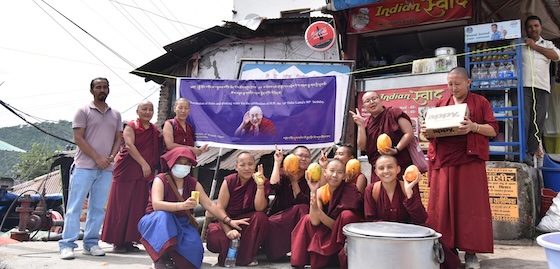
Food offerings to the poor were part of the many and varied public service acts performed by Tibetan Buddhist nuns as part of their celebrations of His Holiness the Dalai Lama’s 90th birthday.
Essay-Writing and Art Competitions
The nuns held essay and drawing competitions to inspire creativity centered around themes connected to His Holiness’s life and messages. Their beautiful drawings and essays were displayed with balloons for all to see.
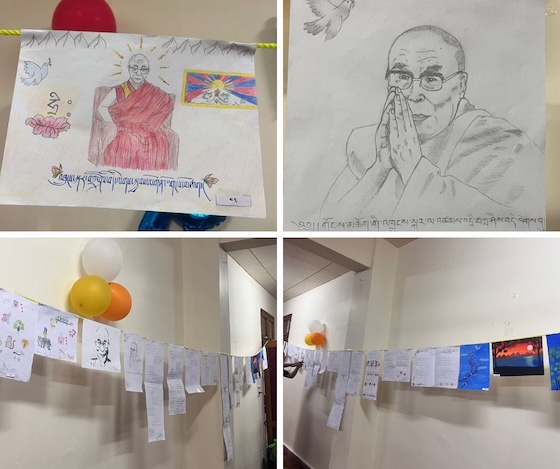
Drawings and essays from Shugsep Nunnery as part of the celebrations of His Holiness the Dalai Lama’s 90th birthday.
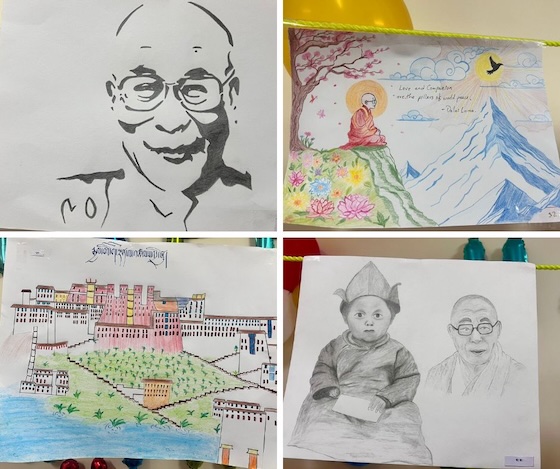
Some of the art from the painting contest by Shugsep nuns as part of celebrations of His Holiness the Dalai Lama’s 90th birthday.
Community Service
The Shugsep nuns undertook a variety of community service events to mark the occasion. They cleaned and tidied the residence of Tibetan elders at the Jampa Ling Old Age Home in Dharamsala as a gesture of respect and service. They held a cleanup drive in their nearby Indian local communities to promote environmental care and community connection. The nuns also planted trees and flowers within the nunnery grounds to beautify the environment and contribute to sustainability and biodiversity.
The nunnery organized food offerings to support and uplift the poor and needy in nearby areas. They cut up fresh local fruit such as papayas and bananas and distributed the food in compostable and biodegradable bowls made of leaves.
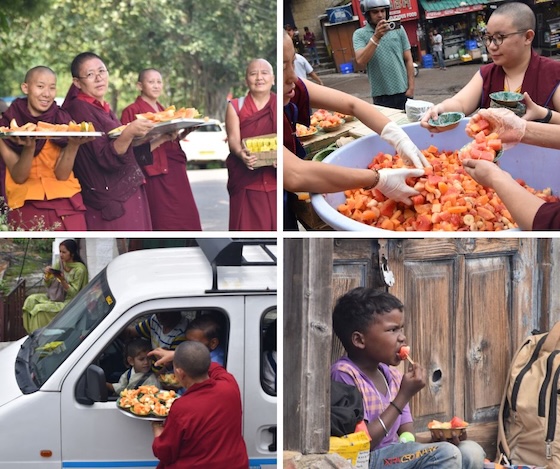
The Shugsep nuns offered fruit and drinks to the local community as part of their celebrations of His Holiness the Dalai Lama’s 90th birthday.
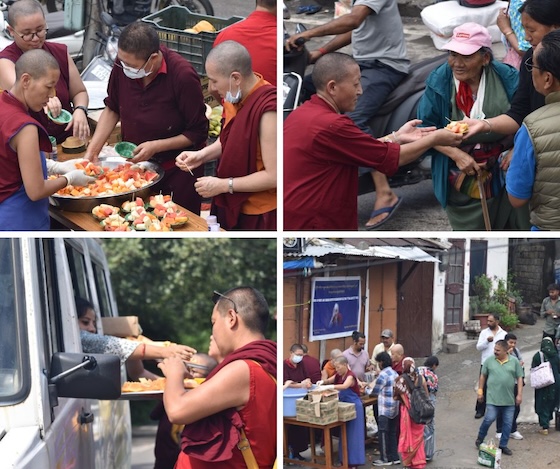
Shugsep nuns distributing fresh fruit and drinks in their community.
Religious and Educational Events
On Namgang, the 30th day of the 4th Tibetan month, the nuns held a grand and elaborate incense offering (sangsol) ceremony at the sacred site of Lhagyal Ri. The nuns held weekly special prayers and offerings to the enlightened beings every Wednesday throughout the season. Wednesday, known as “Lhakar” (White Wednesday) in Tibetan, is considered a special day for the Dalai Lama because it’s believed to be his birth day and a day for expressing devotion to him.
The nuns also held a thoughtful group discussion on the Four Commitments of His Holiness —universal responsibility, inter-religious harmony, preservation of Tibetan culture, and revival of ancient Indian wisdom — to deepen the nuns’ understanding and reflection.
Grand Birthday Celebration
On July 6th, the Shugsep nuns held a joyous and grand celebration bringing together the nunnery community in gratitude and reverence. The nuns lavishly decorated their prayer hall with flowers and butter sculptures, offering, and had a three-tiered birthday cake decorated with the snow lions of Tibet. They held prayers and presented kataks, ceremonial white scarves, to the portrait of His Holiness.
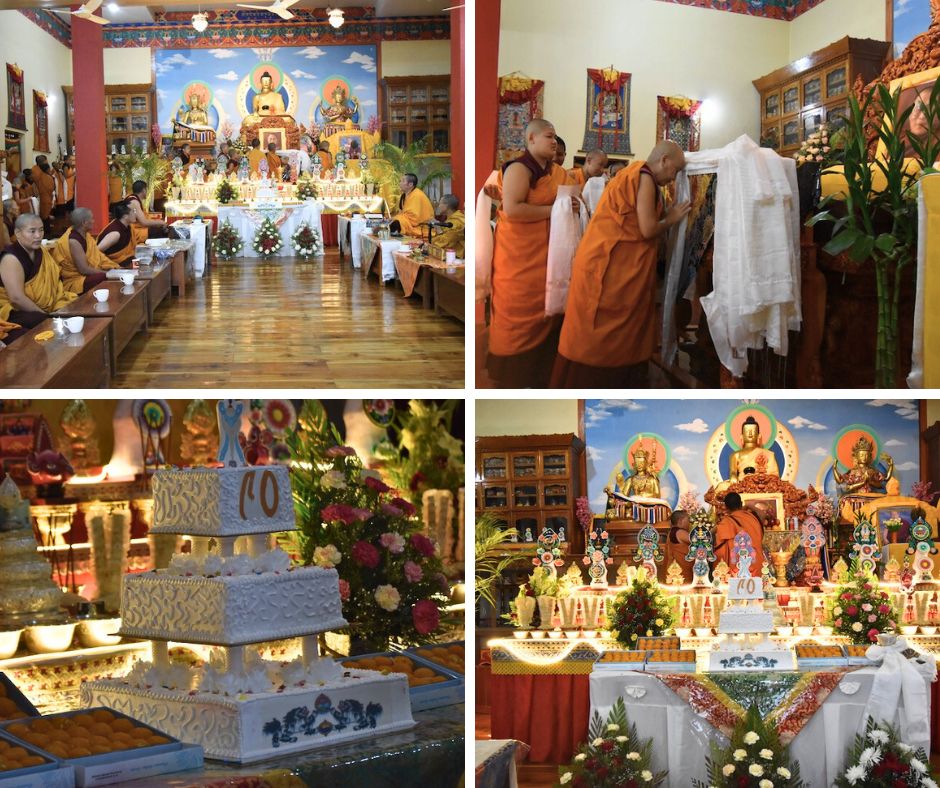
Inside the prayer hall at Shugsep with the beautifully decorated altar and offerings. The nuns lined up to offer khataks, ceremonial Tibetan prayer scarves, to the portrait of His Holiness the Dalai Lama.
The celebrations continue! The Central Tibetan Administration has declared the period from July 2025 to July 2026 the Year of Compassion, marking the global celebration of His Holiness’ 90th birthday. There will be events worldwide to show gratitude and admiration for His Holiness the Dalai Lama and his lifelong commitment to global harmony through teachings of love, compassion, and altruism.

